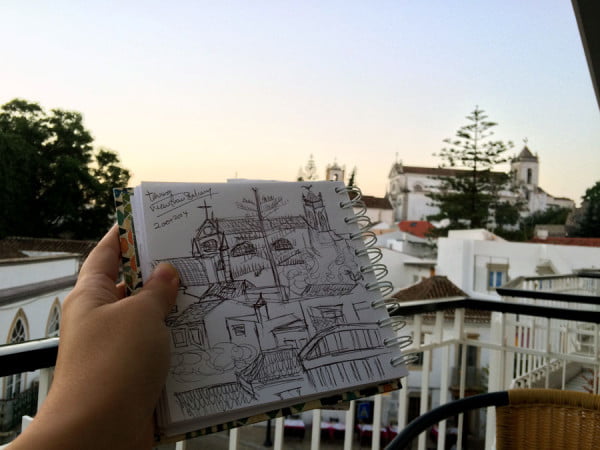After spending 4 hours standing in line to see the Roman Galleries in downtown Lisbon, we decided to head out to nearby Belem to stretch our legs and grab a bite. Belem turned out to be one of my favourite districts to visit in Portugal, and I returned to this little district again when I returned to Lisbon on the tail end of my trip. It’s about 20 minutes from central Lisbon and full of history, art and of course the super famous Portugese egg tarts are not to be missed – here are some things to do in Belem when you are there!
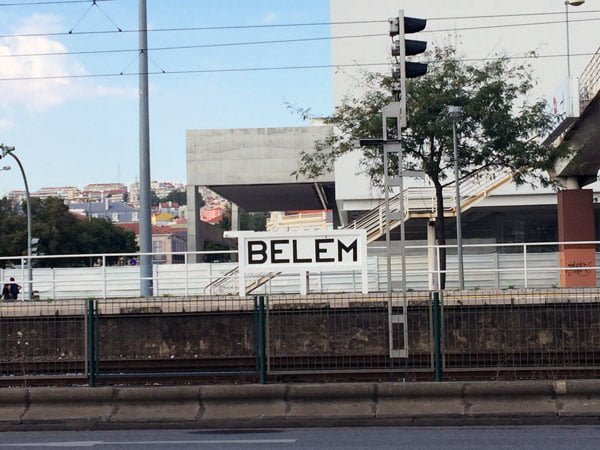
[googlemaps https://mapsengine.google.com/map/embed?mid=zxG-z3IHy2oA.kYSY2Cz1kf_A&w=640&h=480]
Pasteis de Belem
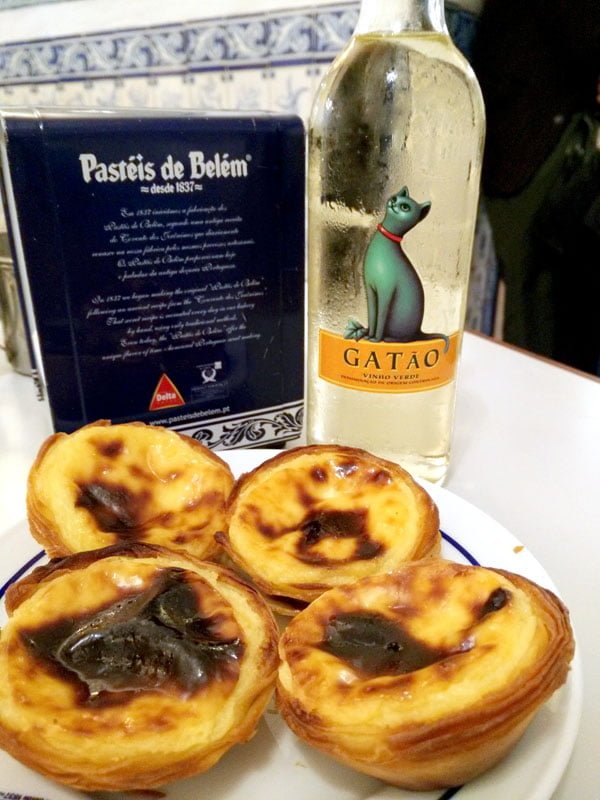
Portugal is famous for its custard egg tarts, known as Pasteis de Natas throughout the country, but if you are headed to Belem, the one thing you have to do is to check out the originator of this wonderful little pastry snack at Pasteis de Belem. These yummy snacks were created right here in Belem, by the monks from the nearby Jeronimos Monastery. These egg tarts are so authentic that the rest of the country isn’t allowed to use the term ‘Pasteis de Belem’ because of their copyright (hence they are called Natas instead)!
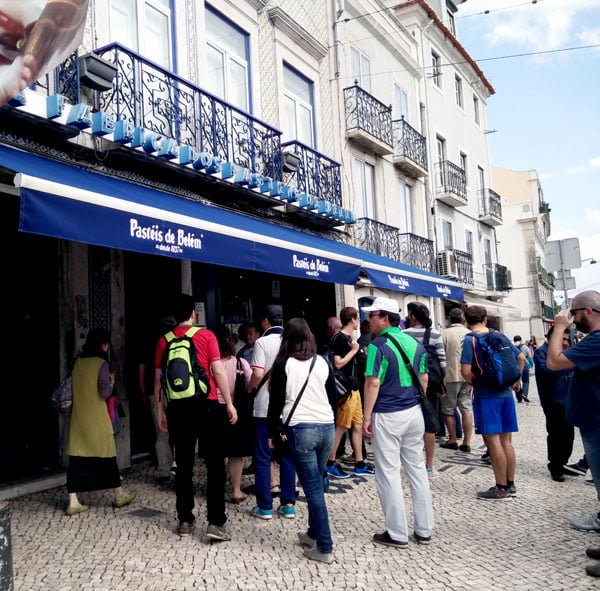
You can’t quite miss this place – it’s likely to have a takeaway queue spilling out its doors which can be quite off-putting, but I suggest popping in to sit down and eat if you can – walk past the queues and mill around inside, it’s surprisingly big, and there are seats in the back as well. It gets really crowded during peak hours but they do quite brisk business, so if you wait around a bit, you should be able to find yourself a seat. Each waiter services a specific area, so look out for the one in charge of your zone to place your order.
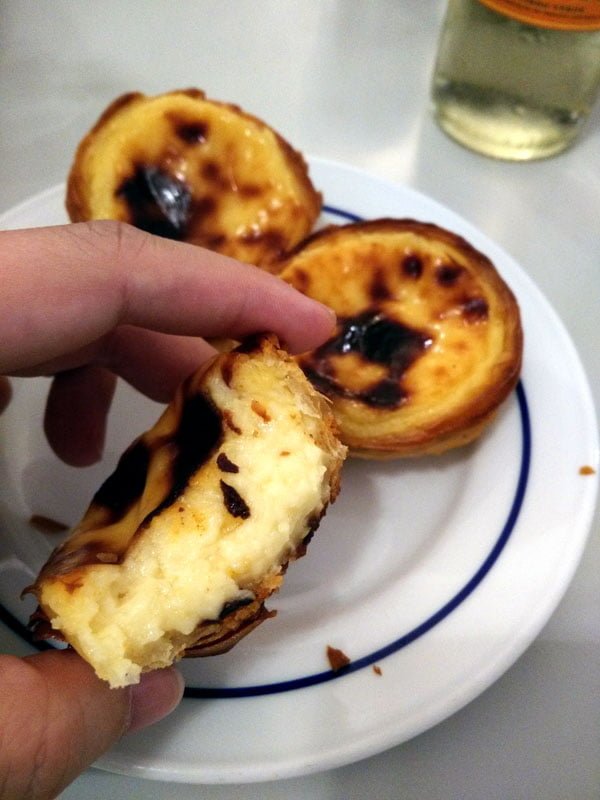
The famous Pasteis de Belem (1.05 euro per pc) is definitely high quality – the custard is tasty without being too cloying, and the pastry layers are crispy and flaky. I highly suggest you order at least 2 pcs each!
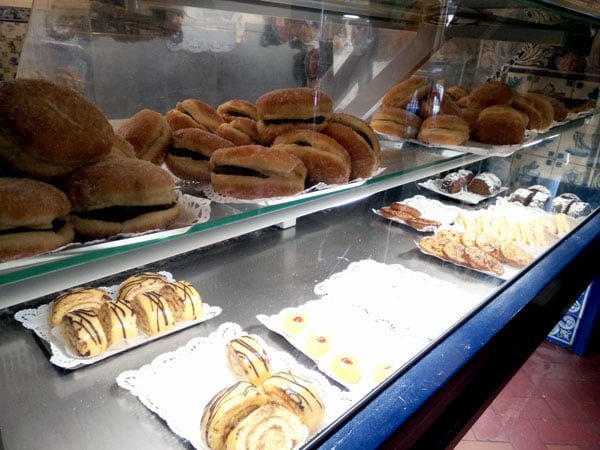
But the shop sells other Portuguese snacks besides the egg tarts – we tried a bunch of things: beef croquette, cod cake and ham quiche. Our lunch was then topped off with some Portuguese drinks – I had the Sagres beer while Y had the cutest Vino Verde or Green wine (it’s quite light) called Gato.
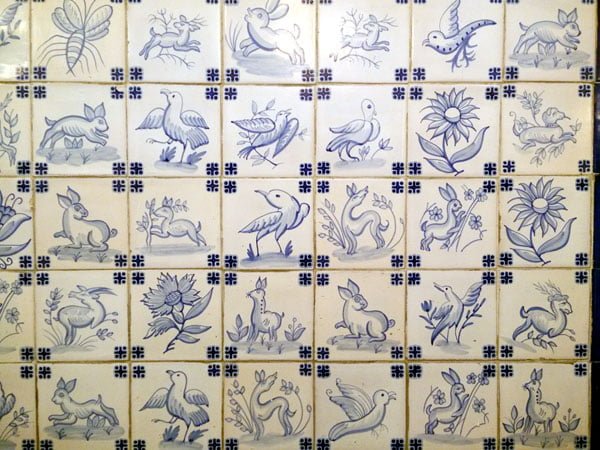
Also, take note of the lovely unique Portuguese Azulejos designs on the walls – these designs with animals are different from the Moorish inspired geometric shaped ones.
Pasteis de Belem
Rua de Belem 84-92
Opening Hours: 8am – 11pm daily
Mosteiro dos Jeronimos (Jeronimos Monastery)
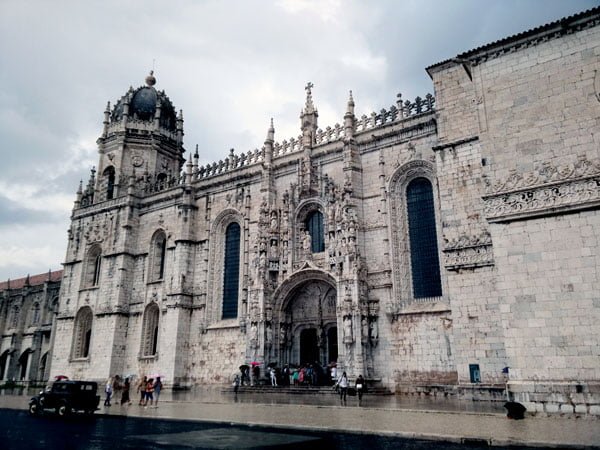
This UNESCO World Heritage site is just down the road from the Pasteis de Belem shop, and quite a massive complex. It cost 12 euro for a joint ticket to enter the monastery and the tower of Belem (more on that below), but if you’re feeling broke, the Church of Santa Maria is free to enter and gives an excellent taster on the beauty of the monastery’s architecture.
The late Gothic Manueline style is kinda dark but really grand – the ceiling is a sight to behold, the detailing of the architecture is exquisite. You’ll also see the tombs of Portuguese explorer Vasco de Gama and poet Luís de Camões in the church.


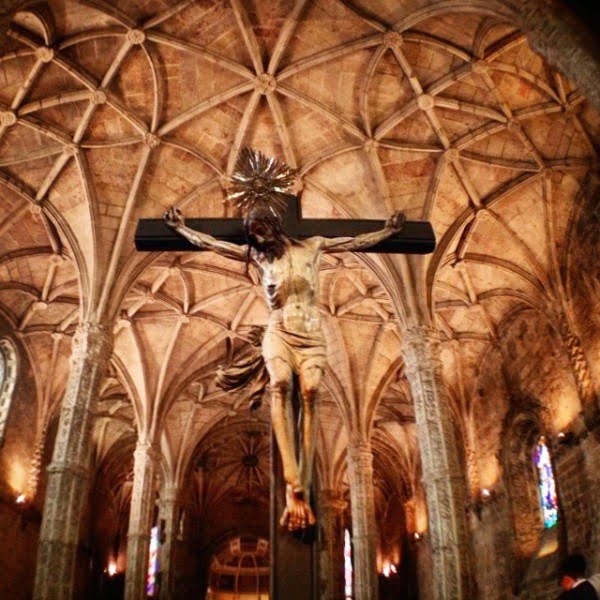

I would recommend you enter the monastery if you have the time – the architecture is quite fantastic to see up close, and there are a bunch of permanent exhibitions on the history of Lisbon within which make for a good primer on the city. I wasn’t sure if I wanted to visit the monastery after seeing just the Church the first time around, but I’m glad I decided to give it a shot.
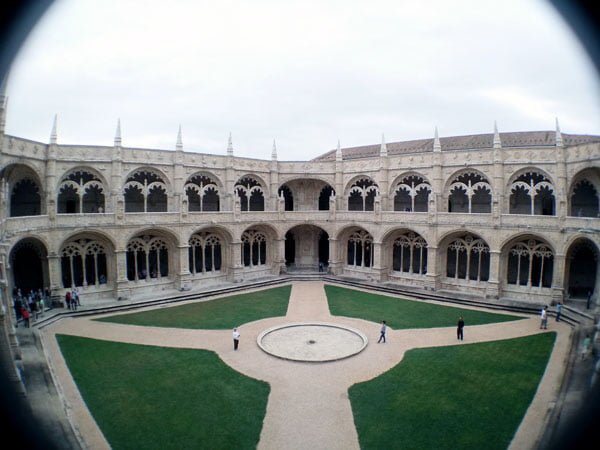

Jeronimos Monastery
Rua de Belem 84-92
Opening Hours: 10am – 5.30pm [oct-may] or 6.30pm [may-sep] daily
Entry: A single ticket is 10 euros. I bought a combined ticket with Torre de Belem for 12 euro. It’s free entry on the first Sunday of each month!
Torre de Belem (Tower of Belem)
The tower of Belem may sound quite as if it is a large and imposing structure, but it is actually a lot smaller than I thought it would be. It is a bit of a walk along the Tagus river from the Monastery (you can cross over via the underpass at the Padrao (more on that below) for a more scenic walk along the river, or you’ll have to walk past the Contemporary Art Museum till you reach the overhead bridge closer to the tower itself.
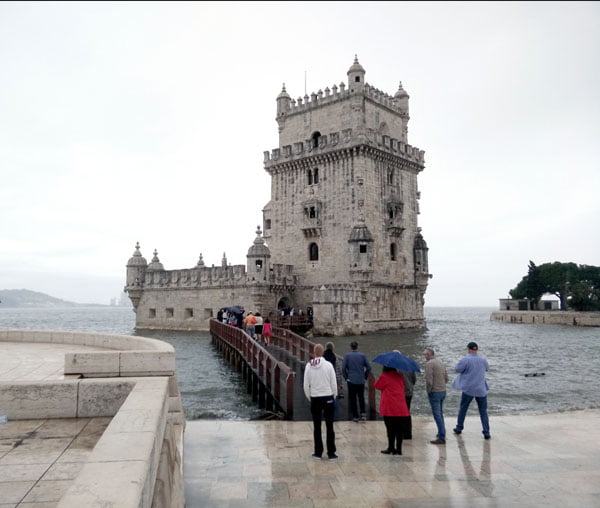
The tower itself is connected to the main land by a little bridge – I was there in the late afternoon, which evidently was high tide and with the rain coming down, getting to the tower without getting splashed at by the waves was a matter of precision timing and wave jumping!

The tower was initially built as part of the city’s defense, but since they built another tower further up the river, this one became less critical as a fort. You can still see the old cannons facing the water on the ground level.
You can also go up to the top of the tower for a panoramic 360 view of the surrounding area, but note that the stairwell is REALLY narrow and winding, so much so that they implemented a queue and alarm system to control the traffic up and down the spiral staircase. After queuing to go up, you get to the top and you see another long snaking queue to go down again!

Torre de Belem
Avenida Brasília 1400-038
Opening Hours: 10am – 5.30pm [oct-may] or 6.30pm [may-sep] daily
Entry: A single ticket is 6 euros. I bought a combined ticket with Torre de Belem for 12 euro. It’s free entry on the first Sunday of each month!
Padrão dos Descobrimentos (Monument to the Discoveries)
From afar, I thought this was the Torre de Belem at first, but this rather unusual looking structure is less of a tower and more of a rather fancy looking monument. The Monument to the Discoveries was built to honour Portugal’s age of Discovery, where explorers like Vasco de Gama and Ferdinand Magellan among others sailed across uncharted territories to discover new lands.


It doesn’t seem so big from a distance, but it’s one of those things where the closer you get, the bigger you realize the monument looms! You can climb up to the roof – I’d already been on top of the Torre de Belem so I passed on that, but I think this one gives you a better view and might be less crowded.

I was quite fond of this huge wind rose and map spanning 50m that covered the ground right by the monument. A gift from the South African government because Portuguese explorers were recognized as the first to discover the Cape of Good Hope.

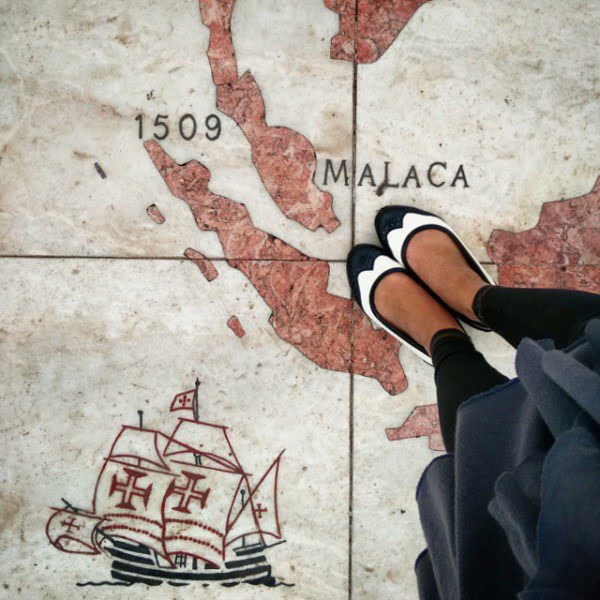
Padrão dos descobrimentos
Avenida Brasília 1400-038
Opening Hours: 10am – 6pm [oct-feb] or 7pm [mar-sep] daily
Entry: A single ticket is 3 euros which lets you go to the top 56m high and enjoy quite a spectacular view of the surrounding area
Museu da Electricidade (Electricity Museum)
We had no intention of visiting this spot, but by pure serendipity, there was a large poster advertising a Vhils exhibition at the Museum da Electricidade just as we got off the bus in Belem. I recognized it immediately – like I would in Lagos with Roa, you can’t quite miss Vhils either.
Vhils, or Alexandre Farto, is quite a prominent street artist whose works I first saw in London, so I convinced Y that we needed to see this, so after a satisfying lunch of Pasteis de Belem, we walked over to the Museum da Electricidade to check it out.

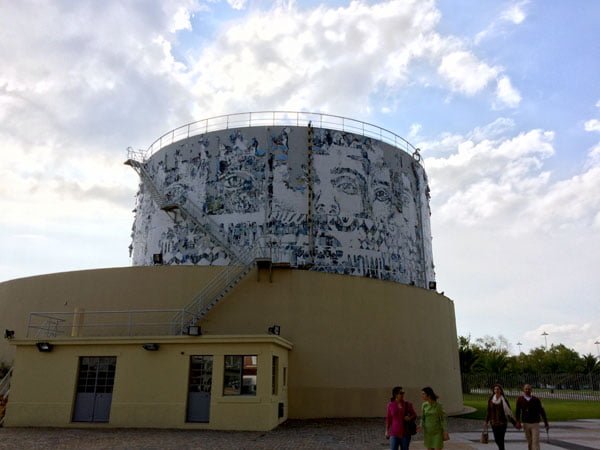
This was once a functioning power station though it was converted into a cultural space and museum in 1990. The absolute best part about this exhibition is that it was FREE. Titled Dissecção/Dissection, this is Vhil’s largest solo show to date – and this Portuguese street artist is just in his 20s, imagine that!

Vhils has a very distinctive subtractive sort of style, in which he often uses the textures of the surrounding surfaces he works, chips away at them to form detailed faces within. A particular technique he’s famous for is using little explosives which blow up on a wall and when the smoke clears, the design emerges. Absolutely amazing to see in action through the videos they had on site.


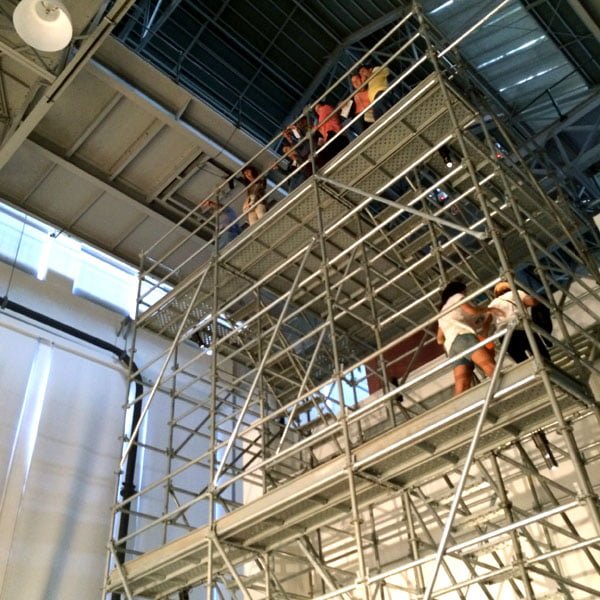

This video gives you an idea of what the exhibition was like, probably better than my pictures do! It was definitely something you had to see in person to really appreciate. Over 60,000 people attended in total, which is pretty impressive!
[youtube https://www.youtube.com/watch?v=MO50ph9aSnM]
There’s another part of the museum which shows some real life dioramas on how the power station used to work before being converted, which gives you a bit of context to the place. But other than that, there isn’t any real need to go in unless they’re having a kick ass exhibition.
Museu de Electricidade
Avenida Brasília 1300-598
I wish I had a little more time though, I would have loved to check out the Centro Cultural de Belem, but it is a MASSIVE space so sadly, I decided to skip it in favour of seeing more of Lisbon while the weather was being cooperative.

How to get to Belem
Take the tram #15 from Praca Figueres or Praca do Comercio. It costs 2.85 euro per trip so I’d recommend either getting a day pass (24 hours, 6euro) or getting the via viagem card (1.40 euro) to top up. You can buy your ticket on the tram in the middle carriages and it takes about 20mins or so. Get off at the Mosteiro de Jeronimos stop.
Alternative, take the bus #718 instead (I think there are other buses as well, this one just happened to be the one available). It follows a parallel route to Belem, except it runs inland instead of along the river like the tram. It feels like there are more locals on the bus compared to the tram. I personally preferred the tram ride because the bus was hella bumpy in some areas, but you do get to see a different side of Lisbon, including this beauty by MAR:
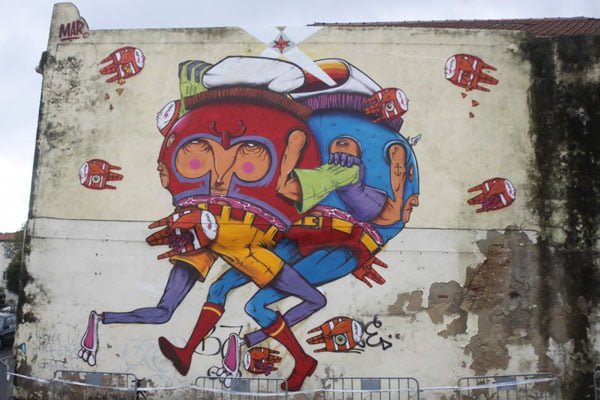
Anything else you’d recommend to check out in Belem that I might have missed? Share with me so I’ll have to go back some day and rectify that! Meanwhile check out more Portugal posts:


